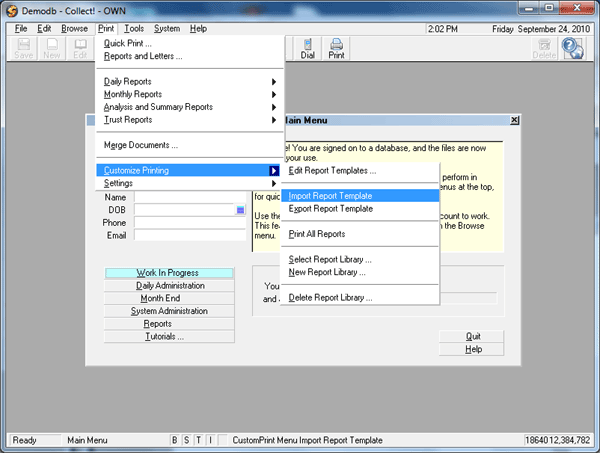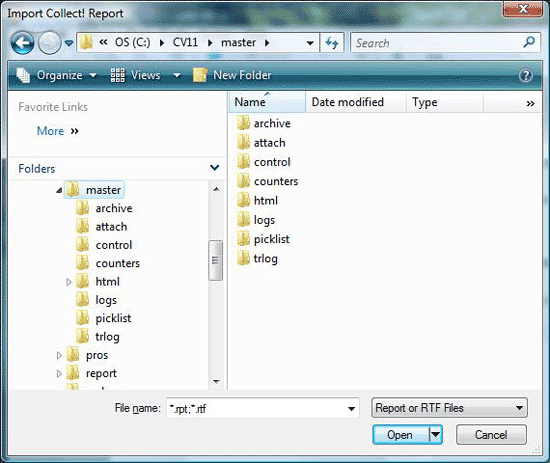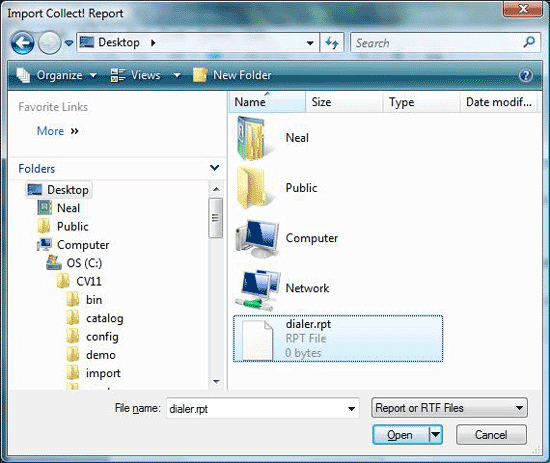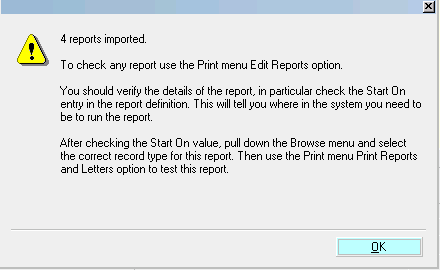Import A Group Of Reports
This topic gives you steps to import a group of reports
into your database.
Reports in your Collect! database may be imported from
an ASCII text *.rpt file. On an individual basis, this process
is explained in How To Import A Report. Using very similar
steps, you may import a series of reports previously
exported and saved as a single report file. This is a
convenient way to import multiple reports in one easy
step.
 Be careful to manage your report list
carefully. It is possible to import any number of
reports. To avoid an unmanageable list with
duplicate reports and too many unused reports,
use this function carefully.
Be careful to manage your report list
carefully. It is possible to import any number of
reports. To avoid an unmanageable list with
duplicate reports and too many unused reports,
use this function carefully.
A group of reports exported from a Collect! database
may be saved to one file with an *.rpt extension. This
ASCII text file might have been sent to you from Collect!
Technical Support, from another office or from another
Collect! user. If you have a report file created in this way,
by exporting a group of reports, you can import the
reports into another database. Collect! parses the file
and creates a separate report in the Report Definition
list for each report in the multiple report file. This is a
very convenient way to import a whole series of reports,
perhaps a custom project, or samples sent from Collect!
Technical Support.
To get the reports into Collect!, we import them
from the report file.
 Is the report file attached to an email
from Comtech Systems?
Then please save this attachment to a location on
your computer where you know you will be able to
find it. For example, save it to your Desktop.
Is the report file attached to an email
from Comtech Systems?
Then please save this attachment to a location on
your computer where you know you will be able to
find it. For example, save it to your Desktop.
When you have the report on your computer and
you know where to find it, proceed with the
steps below to import the reports into Collect!
1. Sign into Collect! as you would normally and
select Print from the top menu bar.

Print Menu
2. Then select Customize Printing, Import Report Template.
The Import Collect! Report dialog pops up.

Import Collect! Report Dialog
3. Locate your report file. If you know the location
and name, you can type this into the Filename:
box. Or, you may use the down arrow next to
the Look In: box to navigate to
the Desktop or to the folder where you saved your *.rpt file.
When you see your *.rpt file, click on it and the name
will appear in the Filename: box.

Report File To Import
4. Select Open to import the reports
contained in the file. You may be asked: "Printer codes
detected. Do you want to overwrite your printer control codes?"

Prompt to Import Printer Control Codes
Select NO unless you are sure you want to overwrite
your current printer control codes.
 If you are importing reports with updated
Printer Control Codes, please select YES here to
overwrite your report codes with the new updated set.
If you are importing reports with updated
Printer Control Codes, please select YES here to
overwrite your report codes with the new updated set.
5. Your reports will be imported immediately and a
message will show the number of reports that were
imported with brief instructions for testing your reports.

Imported Report Confirmation Message
Select OK to close the window.
6. Examine your Report Definition list. Generally, the
new reports may be found at the top of the list.
Check out the results of your reports. Print a sample
to make sure the output is what you expect. Please
see How To Print A Sample Report Or Letter for more
details.
Tech Notes
Placing reports in the report list
To place the imported reports in a particular section of your
Report Definition, open the Report Definition list before you
start the import process and select the place in the list
by pressing your space bar.
@include files
If any of the reports you are importing uses an @include
file, make sure that you save the @include file to
your Collect! application's STYLES
folder, (e.g. CV11\styles) so that
Collect! can load it when the report is printed.
Viewing a report outside of Collect!
If you try to open your report, or print it, and you generate
an error message or see gobbledy-gook, it may be that
the report file was opened in a word processor and is
corrupted. Collect! imports ASCII text report files. If you
need to open an *.rpt file outside of Collect!, please open
with a text editor that will not change the format. If you
open with a word processor, MAKE SURE you save it
as a text file and not in the word processor's default format
as this will make the file unusable by Collect! Any
changes made to the report *.rpt file may make it unusable
for importing purposes.
 Please be aware that imported reports DO retain
any additional settings contained in the report definition's
Report Options.
Please be aware that imported reports DO retain
any additional settings contained in the report definition's
Report Options.

See Also
- Report Sample to view sample reports and letters
- Report Topics Index for a list of all report and letter topics
- Export A Group Of Reports
- How To Copy Reports To Master Database

| 
Was this page helpful? Do you have any comments on this document? Can we make it better? If so how may we improve this page.
Please click this link to send us your comments: helpinfo@collect.org